Introduction to Business Law: Vicarious Liability and Duty of Care
VerifiedAdded on 2020/05/11
|8
|1307
|58
Report
AI Summary
This report delves into the core concepts of business law, specifically focusing on vicarious liability and the duty of care. Part A examines the principle of vicarious liability, where an employer can be held responsible for the negligent actions of their employees, using a scenario involving a restaurant and a problematic customer. It highlights the importance of exercising reasonable care to prevent harm. Part B shifts the focus to the occupier's duty of care towards visitors, categorizing them as contractual invitees, licensees, trespassers, and entrants by right. The report emphasizes the higher standard of care owed to invitees, such as customers, and references relevant legislation, including section 14B of the Wrongs Act 1958, which mandates reasonable care to prevent injuries from foreseeable dangers. It analyzes a scenario where a restaurant customer is injured due to a dangerous premises condition, arguing that the occupier breached their duty of care, making them liable for the customer's injuries, even if the customer was intoxicated. The report concludes that the customer is entitled to damages due to the breach of duty.
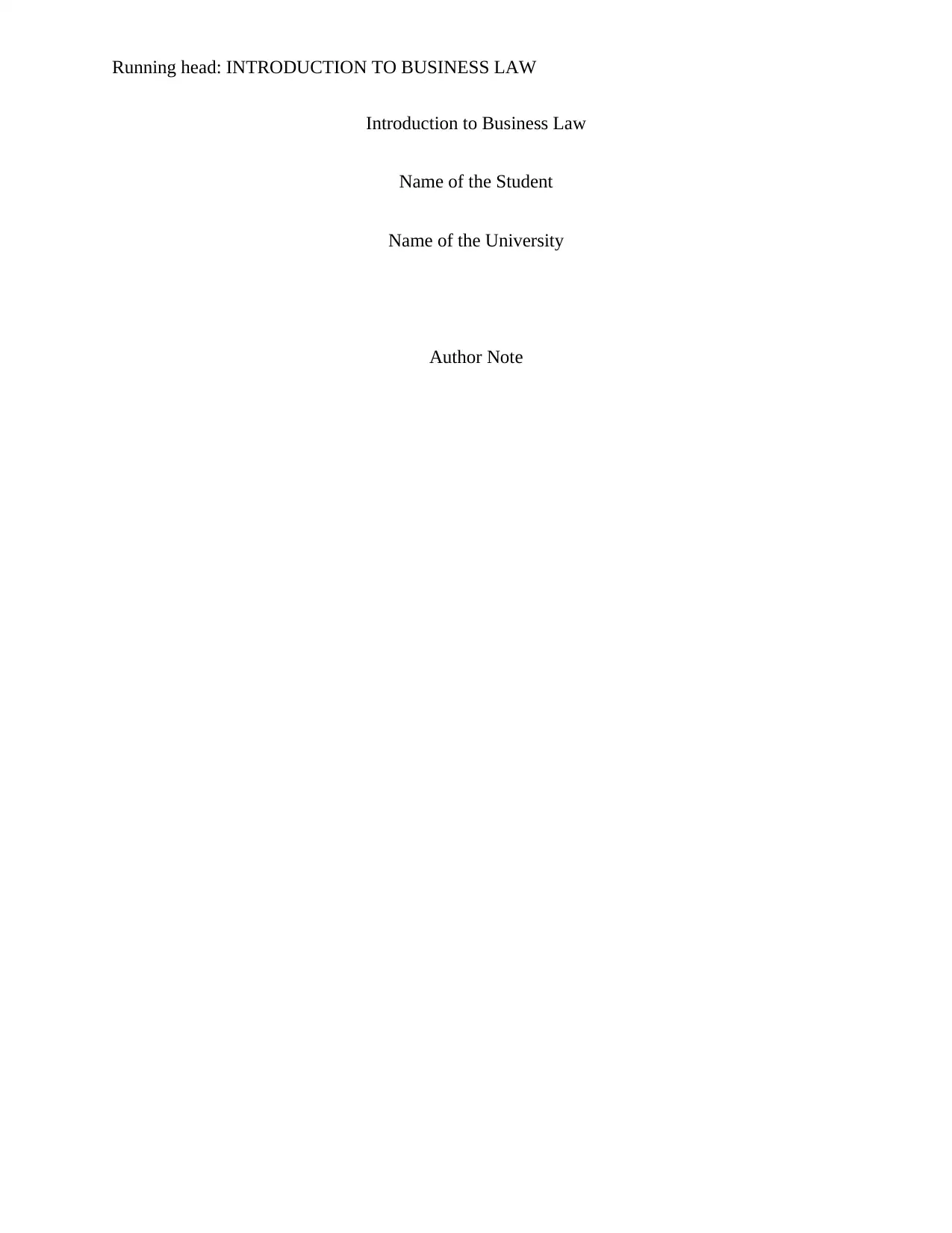
Running head: INTRODUCTION TO BUSINESS LAW
Introduction to Business Law
Name of the Student
Name of the University
Author Note
Introduction to Business Law
Name of the Student
Name of the University
Author Note
Paraphrase This Document
Need a fresh take? Get an instant paraphrase of this document with our AI Paraphraser
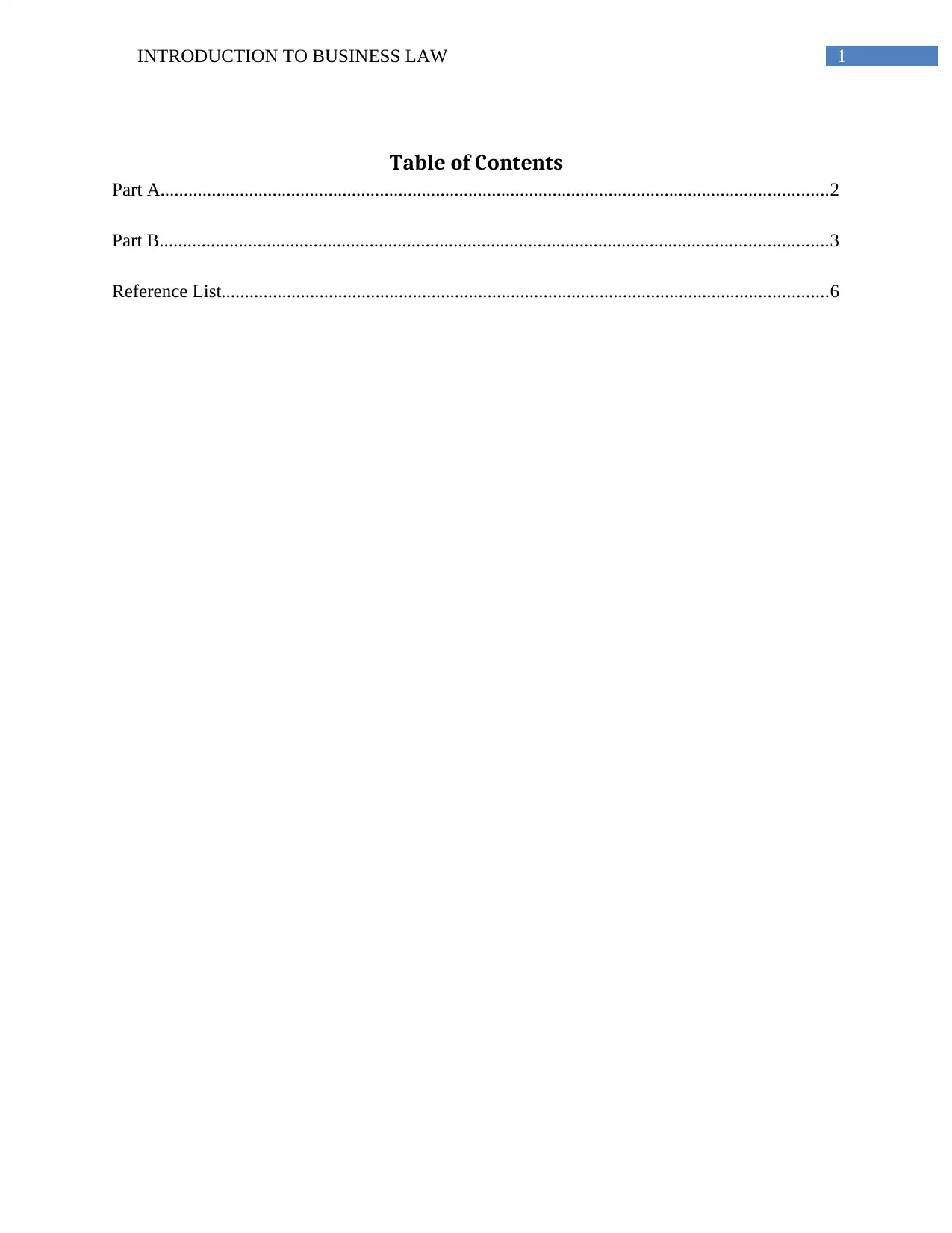
1INTRODUCTION TO BUSINESS LAW
Table of Contents
Part A...............................................................................................................................................2
Part B...............................................................................................................................................3
Reference List..................................................................................................................................6
Table of Contents
Part A...............................................................................................................................................2
Part B...............................................................................................................................................3
Reference List..................................................................................................................................6
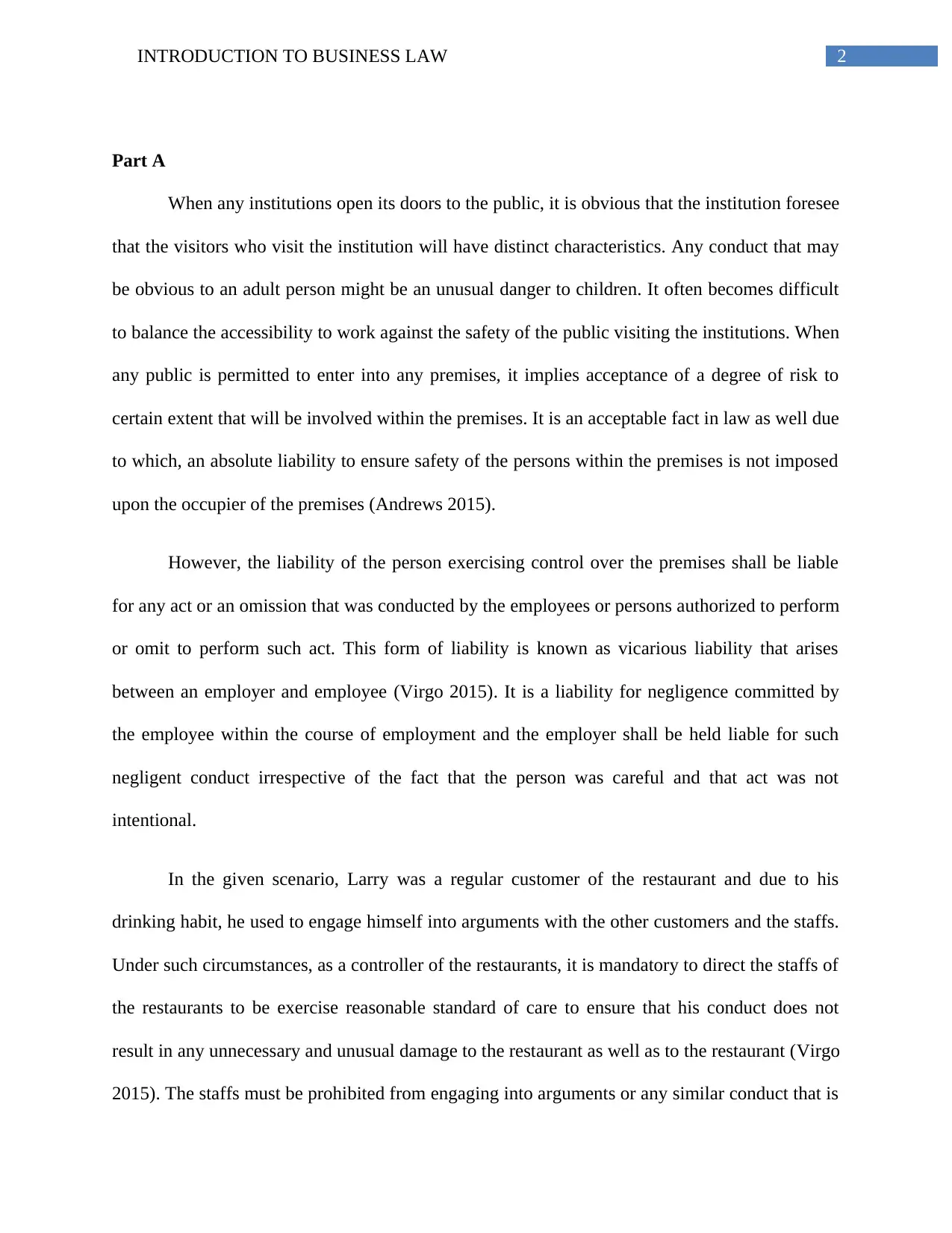
2INTRODUCTION TO BUSINESS LAW
Part A
When any institutions open its doors to the public, it is obvious that the institution foresee
that the visitors who visit the institution will have distinct characteristics. Any conduct that may
be obvious to an adult person might be an unusual danger to children. It often becomes difficult
to balance the accessibility to work against the safety of the public visiting the institutions. When
any public is permitted to enter into any premises, it implies acceptance of a degree of risk to
certain extent that will be involved within the premises. It is an acceptable fact in law as well due
to which, an absolute liability to ensure safety of the persons within the premises is not imposed
upon the occupier of the premises (Andrews 2015).
However, the liability of the person exercising control over the premises shall be liable
for any act or an omission that was conducted by the employees or persons authorized to perform
or omit to perform such act. This form of liability is known as vicarious liability that arises
between an employer and employee (Virgo 2015). It is a liability for negligence committed by
the employee within the course of employment and the employer shall be held liable for such
negligent conduct irrespective of the fact that the person was careful and that act was not
intentional.
In the given scenario, Larry was a regular customer of the restaurant and due to his
drinking habit, he used to engage himself into arguments with the other customers and the staffs.
Under such circumstances, as a controller of the restaurants, it is mandatory to direct the staffs of
the restaurants to be exercise reasonable standard of care to ensure that his conduct does not
result in any unnecessary and unusual damage to the restaurant as well as to the restaurant (Virgo
2015). The staffs must be prohibited from engaging into arguments or any similar conduct that is
Part A
When any institutions open its doors to the public, it is obvious that the institution foresee
that the visitors who visit the institution will have distinct characteristics. Any conduct that may
be obvious to an adult person might be an unusual danger to children. It often becomes difficult
to balance the accessibility to work against the safety of the public visiting the institutions. When
any public is permitted to enter into any premises, it implies acceptance of a degree of risk to
certain extent that will be involved within the premises. It is an acceptable fact in law as well due
to which, an absolute liability to ensure safety of the persons within the premises is not imposed
upon the occupier of the premises (Andrews 2015).
However, the liability of the person exercising control over the premises shall be liable
for any act or an omission that was conducted by the employees or persons authorized to perform
or omit to perform such act. This form of liability is known as vicarious liability that arises
between an employer and employee (Virgo 2015). It is a liability for negligence committed by
the employee within the course of employment and the employer shall be held liable for such
negligent conduct irrespective of the fact that the person was careful and that act was not
intentional.
In the given scenario, Larry was a regular customer of the restaurant and due to his
drinking habit, he used to engage himself into arguments with the other customers and the staffs.
Under such circumstances, as a controller of the restaurants, it is mandatory to direct the staffs of
the restaurants to be exercise reasonable standard of care to ensure that his conduct does not
result in any unnecessary and unusual damage to the restaurant as well as to the restaurant (Virgo
2015). The staffs must be prohibited from engaging into arguments or any similar conduct that is
⊘ This is a preview!⊘
Do you want full access?
Subscribe today to unlock all pages.

Trusted by 1+ million students worldwide
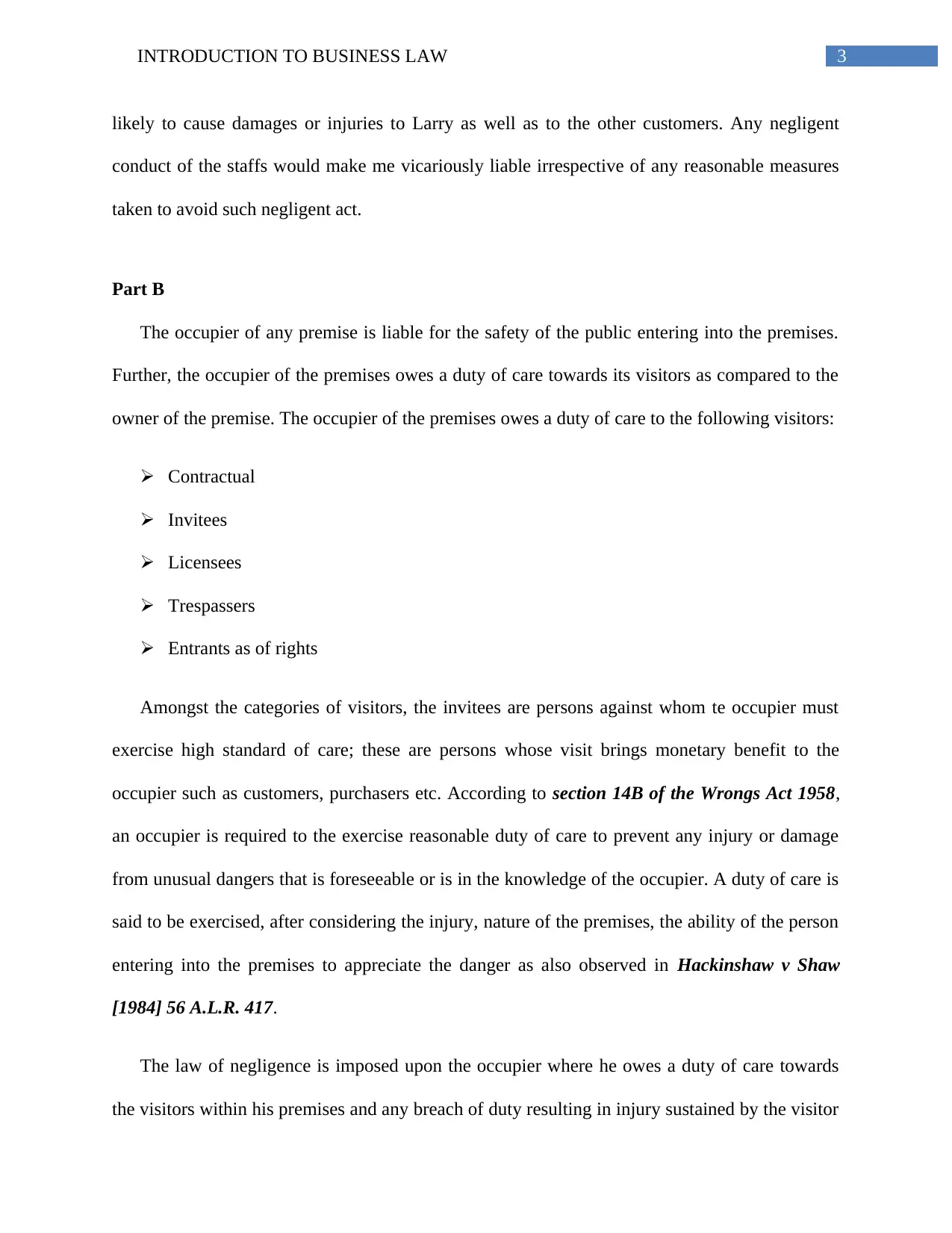
3INTRODUCTION TO BUSINESS LAW
likely to cause damages or injuries to Larry as well as to the other customers. Any negligent
conduct of the staffs would make me vicariously liable irrespective of any reasonable measures
taken to avoid such negligent act.
Part B
The occupier of any premise is liable for the safety of the public entering into the premises.
Further, the occupier of the premises owes a duty of care towards its visitors as compared to the
owner of the premise. The occupier of the premises owes a duty of care to the following visitors:
Contractual
Invitees
Licensees
Trespassers
Entrants as of rights
Amongst the categories of visitors, the invitees are persons against whom te occupier must
exercise high standard of care; these are persons whose visit brings monetary benefit to the
occupier such as customers, purchasers etc. According to section 14B of the Wrongs Act 1958,
an occupier is required to the exercise reasonable duty of care to prevent any injury or damage
from unusual dangers that is foreseeable or is in the knowledge of the occupier. A duty of care is
said to be exercised, after considering the injury, nature of the premises, the ability of the person
entering into the premises to appreciate the danger as also observed in Hackinshaw v Shaw
[1984] 56 A.L.R. 417.
The law of negligence is imposed upon the occupier where he owes a duty of care towards
the visitors within his premises and any breach of duty resulting in injury sustained by the visitor
likely to cause damages or injuries to Larry as well as to the other customers. Any negligent
conduct of the staffs would make me vicariously liable irrespective of any reasonable measures
taken to avoid such negligent act.
Part B
The occupier of any premise is liable for the safety of the public entering into the premises.
Further, the occupier of the premises owes a duty of care towards its visitors as compared to the
owner of the premise. The occupier of the premises owes a duty of care to the following visitors:
Contractual
Invitees
Licensees
Trespassers
Entrants as of rights
Amongst the categories of visitors, the invitees are persons against whom te occupier must
exercise high standard of care; these are persons whose visit brings monetary benefit to the
occupier such as customers, purchasers etc. According to section 14B of the Wrongs Act 1958,
an occupier is required to the exercise reasonable duty of care to prevent any injury or damage
from unusual dangers that is foreseeable or is in the knowledge of the occupier. A duty of care is
said to be exercised, after considering the injury, nature of the premises, the ability of the person
entering into the premises to appreciate the danger as also observed in Hackinshaw v Shaw
[1984] 56 A.L.R. 417.
The law of negligence is imposed upon the occupier where he owes a duty of care towards
the visitors within his premises and any breach of duty resulting in injury sustained by the visitor
Paraphrase This Document
Need a fresh take? Get an instant paraphrase of this document with our AI Paraphraser
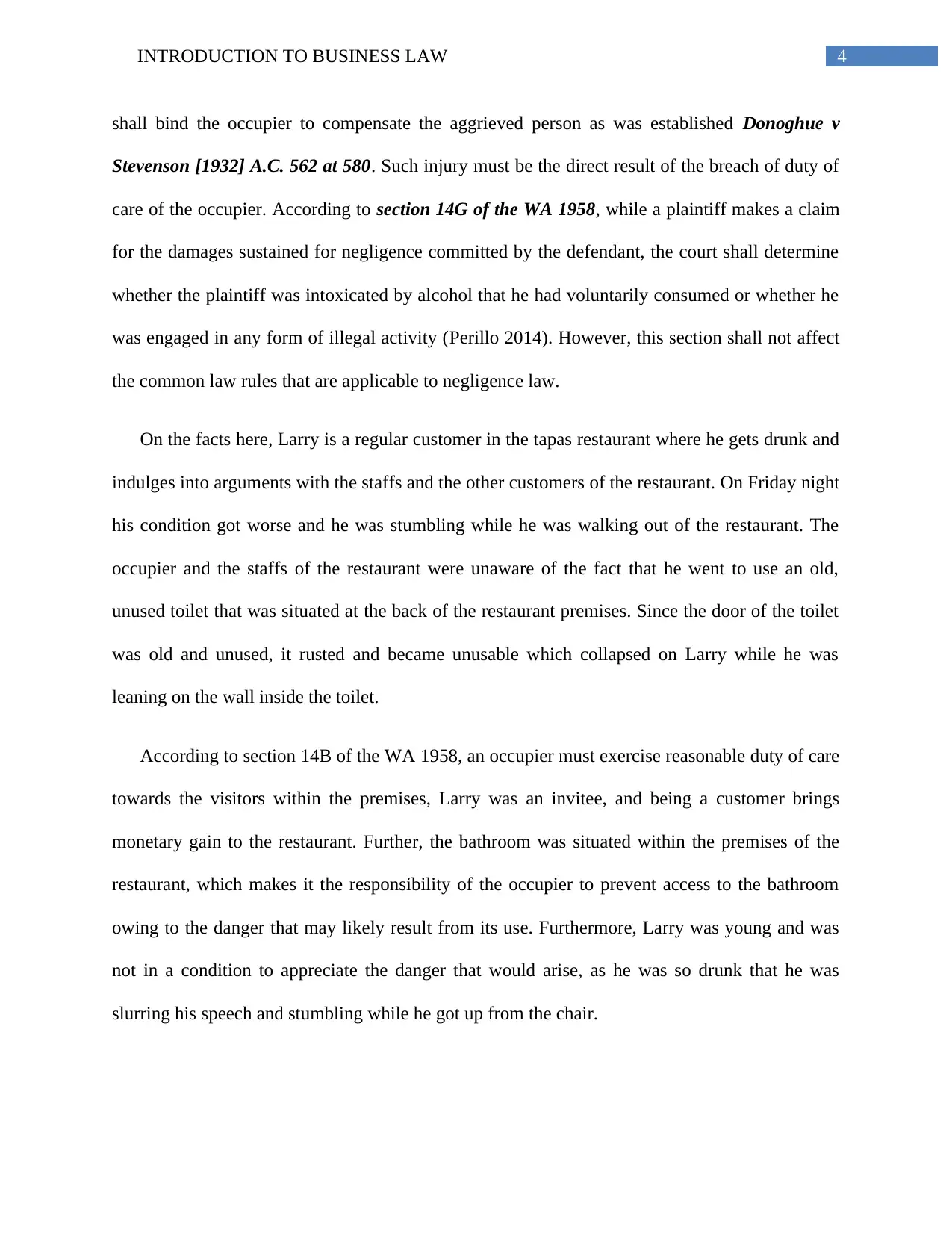
4INTRODUCTION TO BUSINESS LAW
shall bind the occupier to compensate the aggrieved person as was established Donoghue v
Stevenson [1932] A.C. 562 at 580. Such injury must be the direct result of the breach of duty of
care of the occupier. According to section 14G of the WA 1958, while a plaintiff makes a claim
for the damages sustained for negligence committed by the defendant, the court shall determine
whether the plaintiff was intoxicated by alcohol that he had voluntarily consumed or whether he
was engaged in any form of illegal activity (Perillo 2014). However, this section shall not affect
the common law rules that are applicable to negligence law.
On the facts here, Larry is a regular customer in the tapas restaurant where he gets drunk and
indulges into arguments with the staffs and the other customers of the restaurant. On Friday night
his condition got worse and he was stumbling while he was walking out of the restaurant. The
occupier and the staffs of the restaurant were unaware of the fact that he went to use an old,
unused toilet that was situated at the back of the restaurant premises. Since the door of the toilet
was old and unused, it rusted and became unusable which collapsed on Larry while he was
leaning on the wall inside the toilet.
According to section 14B of the WA 1958, an occupier must exercise reasonable duty of care
towards the visitors within the premises, Larry was an invitee, and being a customer brings
monetary gain to the restaurant. Further, the bathroom was situated within the premises of the
restaurant, which makes it the responsibility of the occupier to prevent access to the bathroom
owing to the danger that may likely result from its use. Furthermore, Larry was young and was
not in a condition to appreciate the danger that would arise, as he was so drunk that he was
slurring his speech and stumbling while he got up from the chair.
shall bind the occupier to compensate the aggrieved person as was established Donoghue v
Stevenson [1932] A.C. 562 at 580. Such injury must be the direct result of the breach of duty of
care of the occupier. According to section 14G of the WA 1958, while a plaintiff makes a claim
for the damages sustained for negligence committed by the defendant, the court shall determine
whether the plaintiff was intoxicated by alcohol that he had voluntarily consumed or whether he
was engaged in any form of illegal activity (Perillo 2014). However, this section shall not affect
the common law rules that are applicable to negligence law.
On the facts here, Larry is a regular customer in the tapas restaurant where he gets drunk and
indulges into arguments with the staffs and the other customers of the restaurant. On Friday night
his condition got worse and he was stumbling while he was walking out of the restaurant. The
occupier and the staffs of the restaurant were unaware of the fact that he went to use an old,
unused toilet that was situated at the back of the restaurant premises. Since the door of the toilet
was old and unused, it rusted and became unusable which collapsed on Larry while he was
leaning on the wall inside the toilet.
According to section 14B of the WA 1958, an occupier must exercise reasonable duty of care
towards the visitors within the premises, Larry was an invitee, and being a customer brings
monetary gain to the restaurant. Further, the bathroom was situated within the premises of the
restaurant, which makes it the responsibility of the occupier to prevent access to the bathroom
owing to the danger that may likely result from its use. Furthermore, Larry was young and was
not in a condition to appreciate the danger that would arise, as he was so drunk that he was
slurring his speech and stumbling while he got up from the chair.
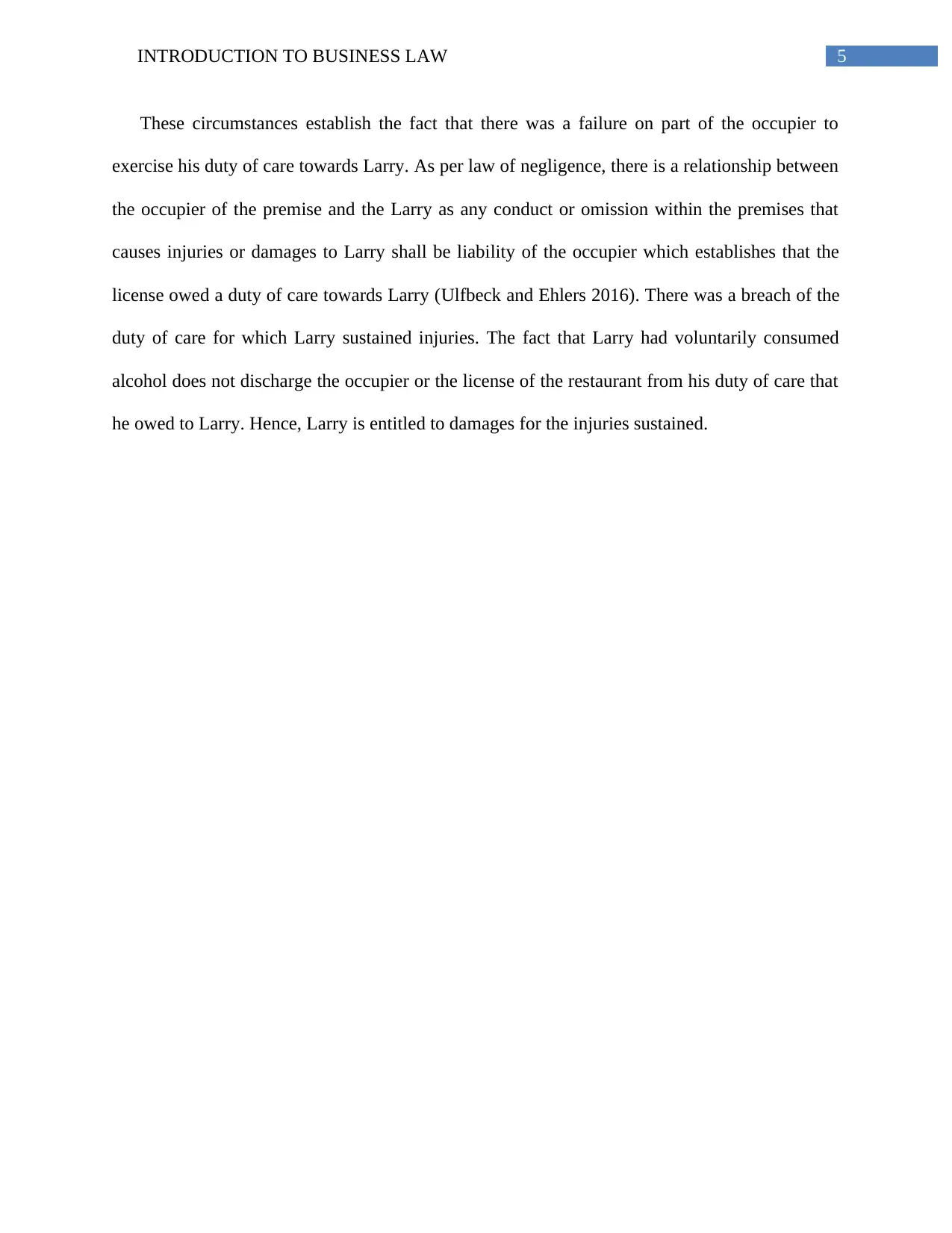
5INTRODUCTION TO BUSINESS LAW
These circumstances establish the fact that there was a failure on part of the occupier to
exercise his duty of care towards Larry. As per law of negligence, there is a relationship between
the occupier of the premise and the Larry as any conduct or omission within the premises that
causes injuries or damages to Larry shall be liability of the occupier which establishes that the
license owed a duty of care towards Larry (Ulfbeck and Ehlers 2016). There was a breach of the
duty of care for which Larry sustained injuries. The fact that Larry had voluntarily consumed
alcohol does not discharge the occupier or the license of the restaurant from his duty of care that
he owed to Larry. Hence, Larry is entitled to damages for the injuries sustained.
These circumstances establish the fact that there was a failure on part of the occupier to
exercise his duty of care towards Larry. As per law of negligence, there is a relationship between
the occupier of the premise and the Larry as any conduct or omission within the premises that
causes injuries or damages to Larry shall be liability of the occupier which establishes that the
license owed a duty of care towards Larry (Ulfbeck and Ehlers 2016). There was a breach of the
duty of care for which Larry sustained injuries. The fact that Larry had voluntarily consumed
alcohol does not discharge the occupier or the license of the restaurant from his duty of care that
he owed to Larry. Hence, Larry is entitled to damages for the injuries sustained.
⊘ This is a preview!⊘
Do you want full access?
Subscribe today to unlock all pages.

Trusted by 1+ million students worldwide
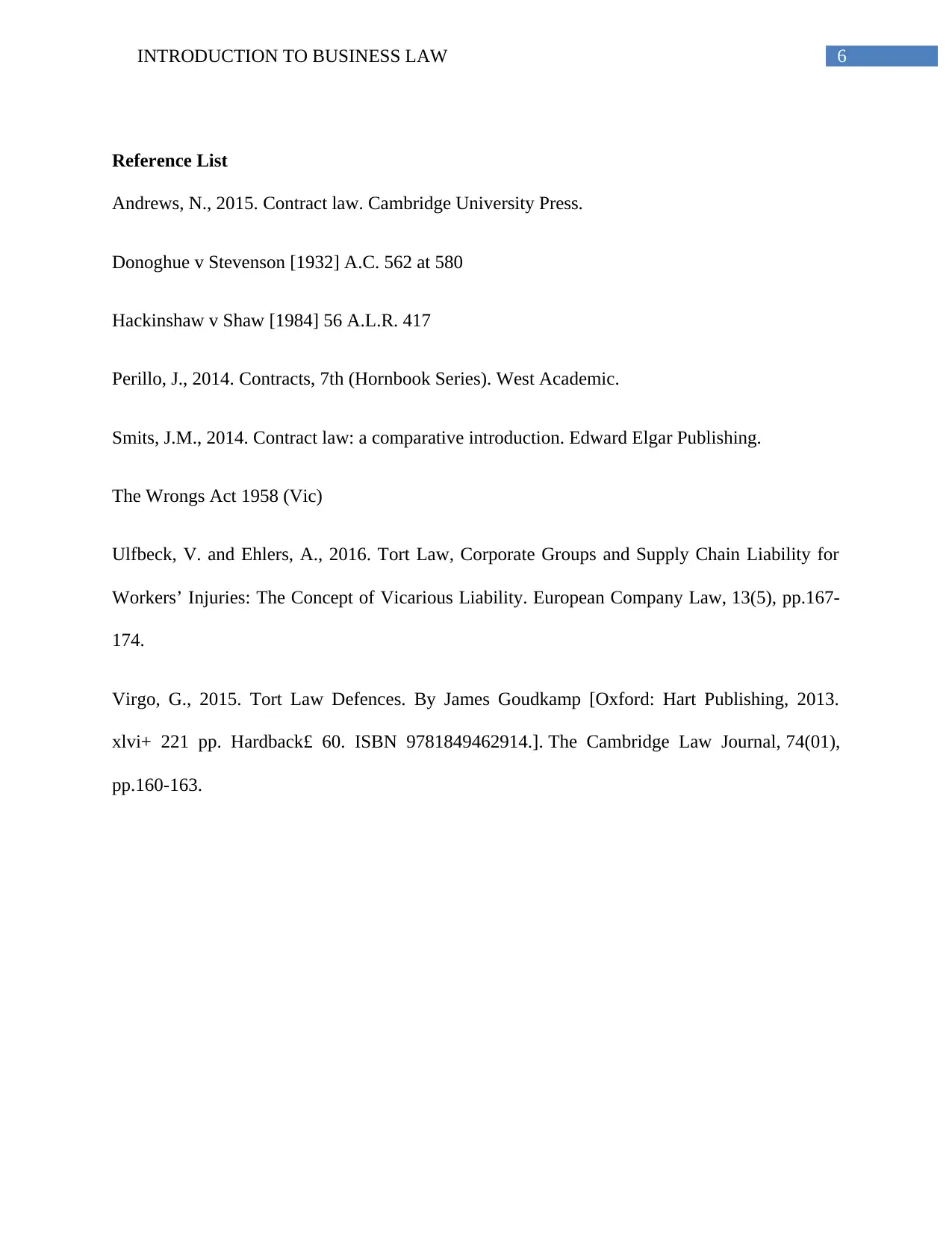
6INTRODUCTION TO BUSINESS LAW
Reference List
Andrews, N., 2015. Contract law. Cambridge University Press.
Donoghue v Stevenson [1932] A.C. 562 at 580
Hackinshaw v Shaw [1984] 56 A.L.R. 417
Perillo, J., 2014. Contracts, 7th (Hornbook Series). West Academic.
Smits, J.M., 2014. Contract law: a comparative introduction. Edward Elgar Publishing.
The Wrongs Act 1958 (Vic)
Ulfbeck, V. and Ehlers, A., 2016. Tort Law, Corporate Groups and Supply Chain Liability for
Workers’ Injuries: The Concept of Vicarious Liability. European Company Law, 13(5), pp.167-
174.
Virgo, G., 2015. Tort Law Defences. By James Goudkamp [Oxford: Hart Publishing, 2013.
xlvi+ 221 pp. Hardback£ 60. ISBN 9781849462914.]. The Cambridge Law Journal, 74(01),
pp.160-163.
Reference List
Andrews, N., 2015. Contract law. Cambridge University Press.
Donoghue v Stevenson [1932] A.C. 562 at 580
Hackinshaw v Shaw [1984] 56 A.L.R. 417
Perillo, J., 2014. Contracts, 7th (Hornbook Series). West Academic.
Smits, J.M., 2014. Contract law: a comparative introduction. Edward Elgar Publishing.
The Wrongs Act 1958 (Vic)
Ulfbeck, V. and Ehlers, A., 2016. Tort Law, Corporate Groups and Supply Chain Liability for
Workers’ Injuries: The Concept of Vicarious Liability. European Company Law, 13(5), pp.167-
174.
Virgo, G., 2015. Tort Law Defences. By James Goudkamp [Oxford: Hart Publishing, 2013.
xlvi+ 221 pp. Hardback£ 60. ISBN 9781849462914.]. The Cambridge Law Journal, 74(01),
pp.160-163.
Paraphrase This Document
Need a fresh take? Get an instant paraphrase of this document with our AI Paraphraser
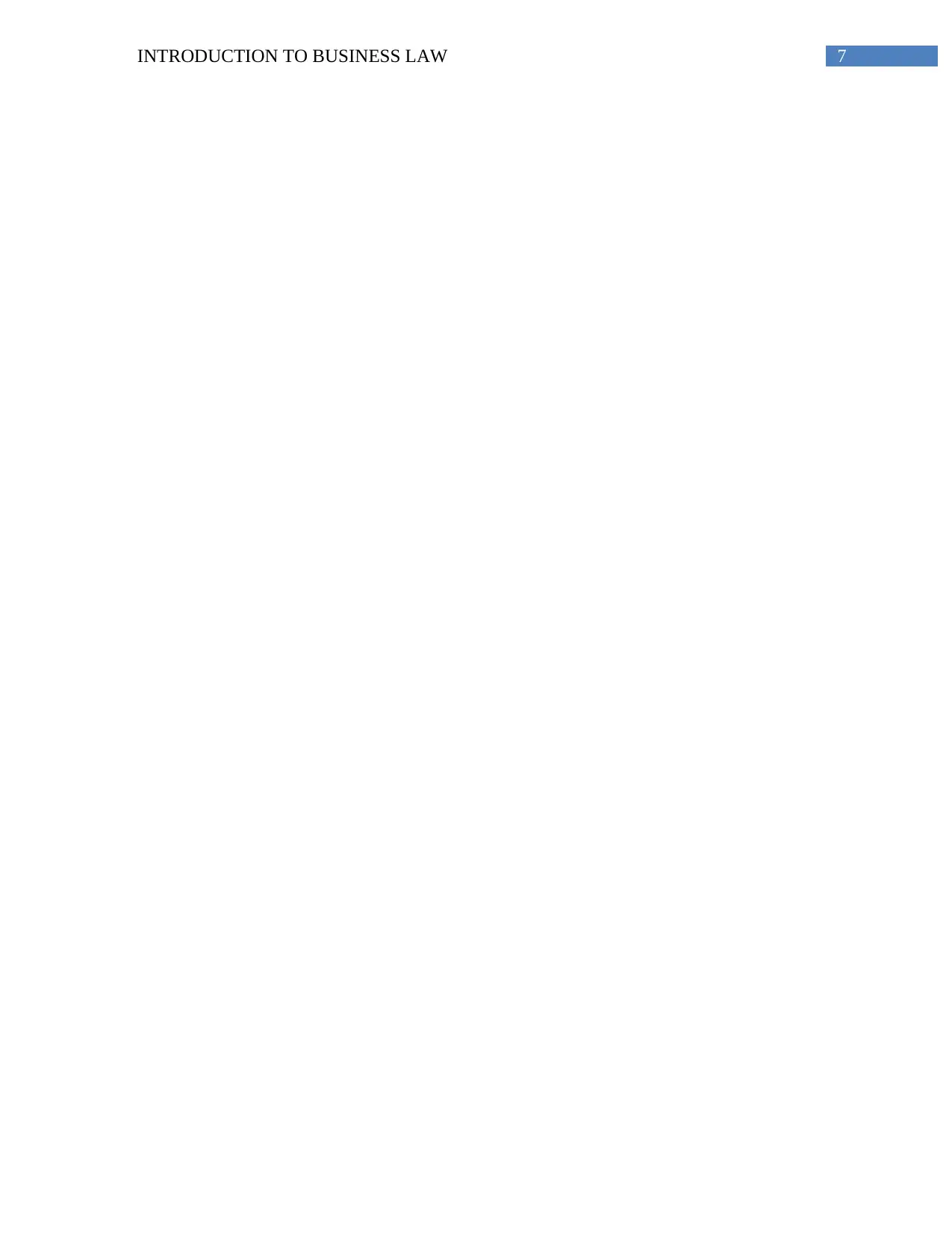
7INTRODUCTION TO BUSINESS LAW
1 out of 8
Related Documents
Your All-in-One AI-Powered Toolkit for Academic Success.
+13062052269
info@desklib.com
Available 24*7 on WhatsApp / Email
![[object Object]](/_next/static/media/star-bottom.7253800d.svg)
Unlock your academic potential
Copyright © 2020–2025 A2Z Services. All Rights Reserved. Developed and managed by ZUCOL.





